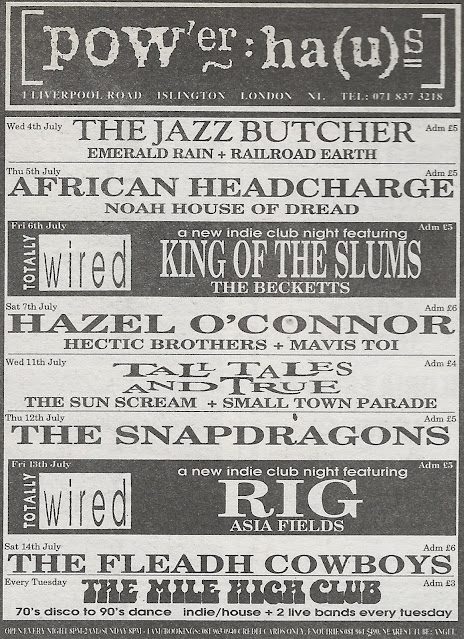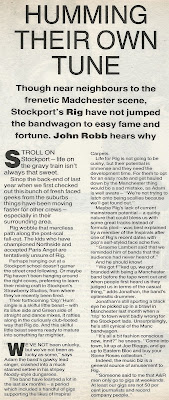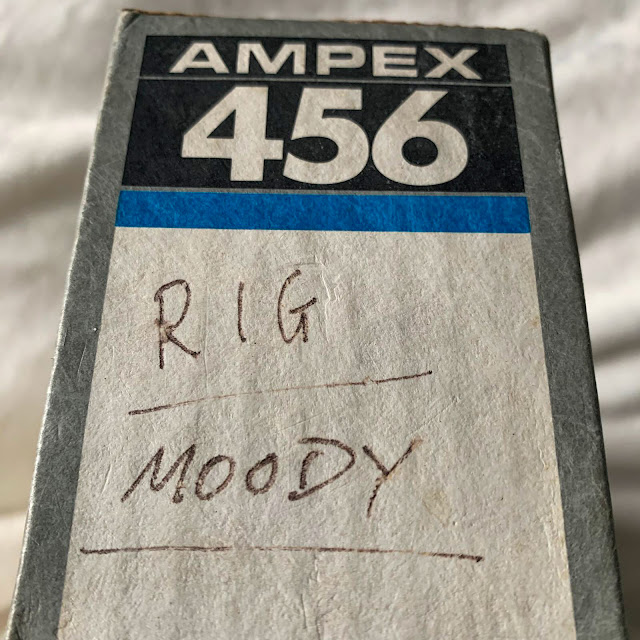On the 7th Day
In March 1990 Rig were sounding off in their first major interview courtesy of Jon Robb in Sounds magazine. The much delayed debut single 'Dig' had been released on Cut Deep records and after a string of prestigious support slots for the likes of The Inspiral Carpets and The Wedding Present they were now embarking on their first headline tour of the UK.
The band ploughed a well established route across the country playing iconic independent venues including the Richmond in Brighton, The Norwich Arts Centre, Jenks Club on the seafront in Blackpool, the Duchess of York in Leeds and the small but perfectly formed Adelphi in Hull.
 |
| Tour dates announcement. Sounds. May 12th 1990 |
 |
| Flyer for the Irn-Bru Rock Week at the London ICA. June 1990 |
At 8.39pm on the night of the ICA gig the Provincial IRA bombed the Carlton Club in London, a popular haunt of Tory MPs and associates. The Carlton Club was just around the corner from the ICA venue and the band heard (and felt) the explosion which occurred thirty minutes before they went on stage.
 |
| Sounds gig Review. June 1990 |
Dig - The 'heavy' debut single
Thud - A stark funk track which featured on the 'Home' album.
Perfect - A nod to early Talking heads. Another mini-album track.
B.R.O. - The short, sharp live favourite released on the 'Hit The North' Album
Dancetrak - A hybrid of a song from P.Love and Blue who was onstage with the band on the decks.
Spank - An early version of what would become the band's final single.
Mango - A barnstorming early song, sometimes reserved for encores.
Moody - A developing version of the ESG dance floor groover.
Sweat - Another popular live song with a killer guitar riff.
V-Funk - Another mini-album song that would sometimes end the set in an improvised jam.
 |
| Flyer for Jenks Bar. Blackpool. June 1990. |
1990 was the second Summer of Love and that love was for Manchester. The cultural restart of the city, which the Festival of the Tenth Summer at the G-Mex in 1986 is cited as the catalyst was now at a commercial peak. People were travelling from across the country and Europe to discover the Hacienda and 'Madchester' for themselves. In May, the Stone Roses played to 30,000 devotees at Spike Island, an industrial outcrop in Wigan. In the crowd that day was Rig guitarist Darren Jones. "I can remember bumping into Clint Boon and discussing how big the whole thing had got. The Inspiral Carpets had just sold out a 10-date tour. The gigs were getting bigger and bigger."
Manchester dominated every chart. Northwest acts made up more than a quarter of the top 40 from this dancefloor chart from Sounds magazine in June 1990.
 |
| Sounds chart. 16th June 1990 |
Sky magazine were introducing it's readers to the next wave of the Manchester gang.
 |
| Sky Magazine. May 1990 |
There was more than a little envy from folk outside the Greater Manchester area and a certain weariness of the fixation on the area. The NME were even letting you know where to dispose of, en masse, of Manchester's main players.
 |
| NME gossip column. 28th April 1990 |
If there were ever any doubts about how big this phenomenon had got, they were quickly dispelled when a five-page spread in Rolling Stone magazine dedicated to the 'Music, drugs and clothes' of an industrial north west town in the UK appeared on the US news stands on 31st May 1990.
This was global. And it was great for Rig to get a passing mention in this iconic magazine.
 |
| Rolling Stone Magazine. 31st May 1990 |
 |
| Manchester. Rolling Stone Magazine. 31st May 1990 |
 |
| Excerpt. Rolling Stone Magazine. 31st May 1990 |
The big hitting magazines continued with their coverage of the Manchester scene. The famous 'Spike Island' edition of the Face magazine with Cate Moss on the cover was almost entirely dedicated to all things Mancunian.
 |
| Face Magazine 1990 |
Just in case your band ego was starting to run away with yourself, the beautiful people at the Face magazine were keen to make sure you were under no illusion as to what these new young upstarts actually looked like, even if they thought the record was 'well sound'.
 |
| Face Magazine. July 1990 |
On May 30th 1990, just three days after Spike Island, Rig were in Brighton at the famous Richmond venue. This new video for the song 'Loop 6' features some great footage of the band from that gig in Brighton and their frolics on the seafront. Life on the road for a Manchester band on tour at the height of Madchester wasn't that glamorous, but it was a lot of fun.
At the end of July the band played two storming gigs at the Powerhaus in Islington, London and at the International One in Manchester supporting Revenge. It was at the International gig that the band met the new manager of the venue, Jenks, who would soon become their new manager.
 |
| Powerhaus press advert July 1990 |
It was a hot and sweaty summer night in 1990 at the Powerhaus in Islington. The band were receiving some great live reviews. "Fresh, frenzied and fractious. Rig are built to last. Dig the new breed". "A compelling dance groove, more infectious to feet than corns and verruca's put together".
 |
| Sounds gig review 4th August 1990 |
 |
| Record Mirror gig review. 4th August 1990 |
But there was an energy and a determination, evident from the band's live performances to keep them driving forward. So despite the band suddenly finding themselves without a record label, they were in no mood to hang around feeling sorry for themselves. They headed straight back into the studio, this time working with A Certain Ratio's Martin Moscrop on possibly their next single should they find a suitor. The work in progress was aptly a cover version of a song from an early Factory label band called ESG. The song had been part of their live set for several months and was called 'Moody'.






After all these years I suddenly had a memory of seeing Rig at the Duchess of York in Leeds. Google brought me here and this post has placed the gig as June 1990. If I remember rightly the gig was very sparsely attended which was a real shame because to my 17 year old self I was convinced Rig would go on to be massive. They put on a great live show that night.
ReplyDeleteThanks for this blog, it's great to have so much background to Rig and their later incarnation as Flatback 4.
And to this day I always say a fan of canta when I want some fizzy orange.